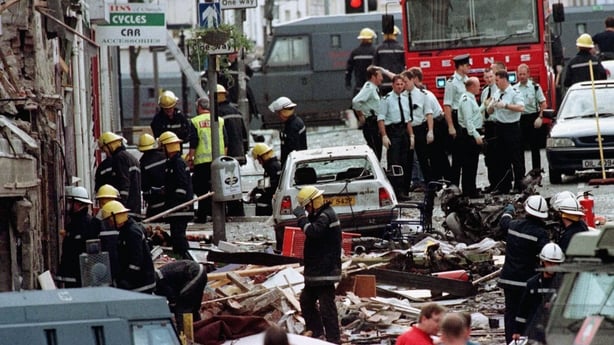A former minister for justice and minister for foreign affairs has said he fears vital evidence may not be available to a UK inquiry into the Omagh bombing because the Irish Government is not holding its own statutory hearings and cannot compel witnesses to co-operate with a process in another jurisdiction.
Taoiseach Micheál Martin and Tánaiste Simon Harris have consistently said the Irish Government will co-operate fully with an inquiry established by the British government.
That inquiry, which started last week with commemorative hearings for the 29 people who were killed, will examine whether the 1998 atrocity could have been prevented.
Charlie Flanagan told RTÉ News he shares the view of some of the relatives that there should have been a parallel inquiry in the Republic.
The bomb was made in the Republic, many of those involved in planning and carrying out the attack lived in the south and went back across the border after the car bomb was left in Market Street in Omagh.
"A parallel inquiry was imminently desirable because it would have allowed both jurisdictions to proceed at more or less the same pace," Mr Flanagan said.
The Defence Force's military intelligence section J2 and An Garda Síochána would have been responsible for monitoring the activities of dissident republicans in the Republic at the time of the attack, including the handling of informers.
Analysis: How will Government 'co-operate' with Omagh bomb inquiry?
The UK inquiry can compel current and former members of the British security services and police forces to give evidence but cannot do so for anyone in another jurisdiction.
The Irish Government has said several times that it will introduce new legislation to facilitate co-operation with the inquiry if appropriate, but this has not been done, and it is thought any new laws would only deal with the legal mechanisms to authorise the release of intelligence material.
Mr Flanagan said the expectations of victims have been raised by repeated assurances of co-operation, and he is concerned that those expectations may not be met.

"I accept fully what Micheál Martin and Simon Harris have consistently said about the Irish Government co-operating fully with the inquiry, but I think an opportunity has been lost by not having a parallel process," he said.
"It would have been grounded in our own legislation and been based on statute passed by the Dáil and the inquiry chairman could have worked in tandem with the UK statutory inquiry and that would have allowed any gaps to be closed. My fear now is that there will be gaps.
"I am concerned that the Irish State will overuse national security, that they will use national security issues too liberally."
National security issues could potentially mean any current or retired members of J2, An Garda Síochána or others with relevant knowledge about the bombing who wanted to appear before the UK inquiry being limited in what information they could share.
The former Fine Gael politician, who retired from politics at the last General Election, is concerned that the absence of a parallel legal process in the Republic means former Irish intelligence or police officers with important information can decide not to co-operate and cannot be compelled to do so.
"Under the current UK terms of reference, while the Irish Government says it will not be found wanting, my concern is that we will not be able to square that circle on compellability and that vital evidence may not be forthcoming," he said.
He also fears that the decision not to hold a parallel inquiry will damage confidence in the ability of the UK hearings to get to the truth about who knew what and when about the bombing.
We need your consent to load this rte-player contentWe use rte-player to manage extra content that can set cookies on your device and collect data about your activity. Please review their details and accept them to load the content.Manage Preferences
Claire Hayes, sister of 16-year-old Omagh bomb victim Alan Radford, said last week that she was sceptical about Irish Government assurances to co-operate fully.
"We must not forget that all that happened was within south of the border," she said after making a commemorative statement about her brother.
"The perpetrators belong to the south, they planned it in the south, they built that bomb in the south and they destroyed our town, our lives and our family’s lives forever.
"I’ve very sceptical. I’ve come into this with an open mind as much that I could have but given the fact that they haven’t been compelled to take part, it has been flawed in my opinion from the outset."
Mr Flanagan said the fears of families of those killed that the framework currently established, the UK inquiry, will not be able to provide answers could have been allayed by a parallel process underpinned by legislation.
Michael Gallagher, whose son Aiden was killed in the explosion and who campaigned for more than two decades for a public inquiry, has warned that families will mount a legal challenge if the Irish Government does not co-operate fully.
DUP leader Gavin Robinson repeated his party’s call for the Irish Government to establish a parallel statutory inquiry after he spoke to Mr Harris by phone on Tuesday.
"The Republic of Ireland cannot continue to ignore the fact that the bomb was planned, prepared and transported from south of the border. Their refusal to hold an inquiry only raises further questions," he said in a statement afterwards.
"This was the deadliest atrocity of the Troubles, and it is unacceptable that the Dublin Government is refusing to provide a structure which could help bring answers. The victims and their families deserve truth, accountability, and justice on both sides of the border," added Mr Robinson.







